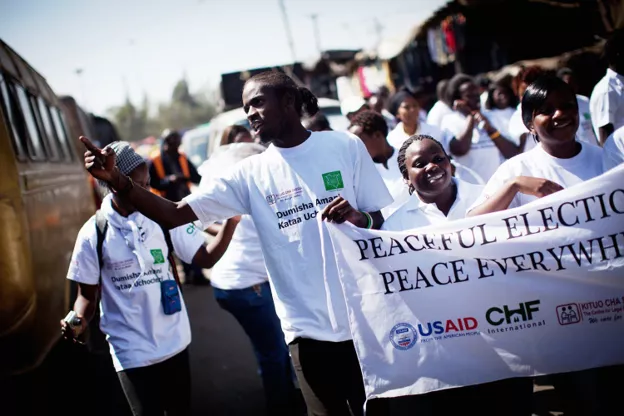Peace and Security
Peace and security are linked to all aspects of development work including strengthening the legitimacy, inclusiveness, and effectiveness of governing institutions and community cohesion and resilience
An estimated 80 percent of countries where USAID provides assistance are at risk of a security, political, economic, or humanitarian crisis. Preventing, mitigating, and adapting to the realities of armed conflict and violence is a development priority. Prevention represents a central tenet of critical policy initiatives, including the U.S. Strategy to Prevent Conflict and Promote Stability, the Women, Peace & Security Act, and the Elie Wiesel Genocide and Atrocities Prevention Act.
Conflict prevention addresses root causes of violence and fosters social cohesion. Activities transform conflict and violence dynamics by influencing individual and community beliefs, attitudes and behaviors and by strengthening local systems for resilience. Peace and security programming covers a range of issues, such as conflict prevention, violence prevention, Countering Violent Extremism (CVE), atrocity prevention, climate and environmental security, among others.
USAID puts people and their needs at the center of targeted peace and security service provision to improve public trust and confidence in local institutions, actors, and processes that are foundational to the development of democratic and accountable governance. Distrust in democratic institutions are triggered, in part or in whole, by injustices, real or perceived or by the failure of governments to live by and uphold the rule of law and ensure the safety and security of their populations. Injustice, government repression and abuse, corruption, favoritism and poor justice and security sector service delivery all erode state systems, services, and society relations.
USAID’s work interrupts pathways to the outbreak, escalation, and recurrence of violence and conflict and promotes peaceful societies. USAID’s broad experience focuses on a comprehensive approach that includes building relationships with key institutions like legislatures, local governments, judiciaries, civil society, and the media to facilitate assistance to peace and security. Establishing a secure environment, strengthening justice for all, and enforcing the rule of law are critical components of USAID’s development agenda.

